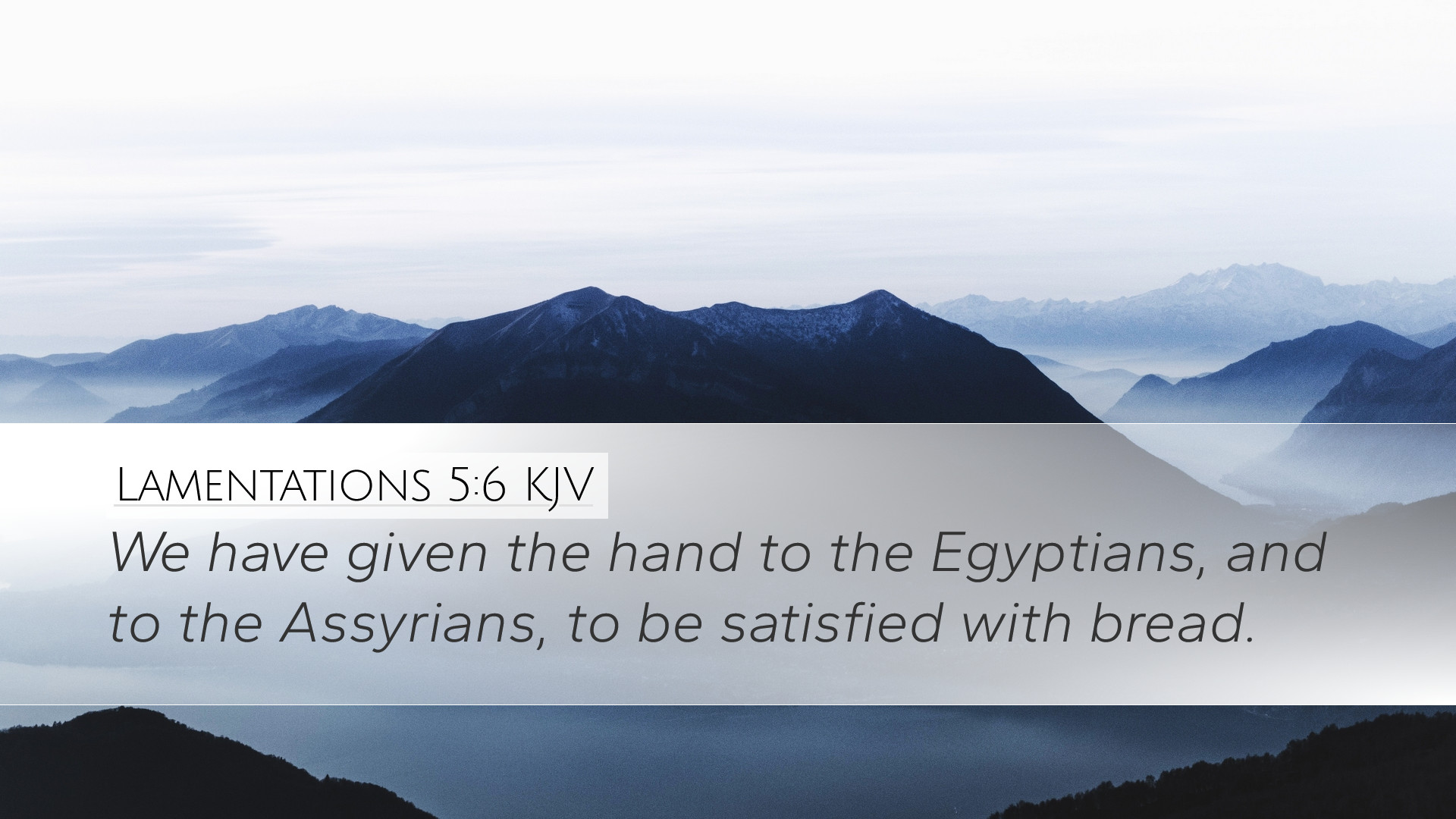Lamentations 5:6 Commentary
Verse Text: "We have given the hand to the Egyptians, and to the Assyrians, to be satisfied with bread."
Introduction
The Book of Lamentations, attributed to the prophet Jeremiah, captures the profound sorrow of the Israelites following the destruction of Jerusalem in 586 BC. In chapter 5, the lament represents the collective cry of a nation devastated by sin, exile, and loss. The verse under examination, Lamentations 5:6, highlights the Israelites' desperation and the lengths they have gone to secure provision from foreign nations.
Contextual Background
The historical context of Lamentations reveals the siege of Jerusalem and the Babylonian exile's consequences. The people of Judah find themselves in dire need, left to seek sustenance from those who have oppressively dominated them, namely Egypt and Assyria.
Commentary Insights
1. The Act of Submission
Matthew Henry: Henry emphasizes that the phrase "given the hand" signifies a submission, indicating the people's readiness to serve their captors for mere sustenance. Such actions reveal the tragic state of a once proud nation reduced to handouts from their former oppressors.
Albert Barnes: Barnes expands on this notion by illustrating that these relationships reflect a deeper spiritual failure. Seeking aid from the Egyptians and Assyrians—the nations that had historically oppressed them—symbolizes a relinquishing of trust in God. The lament underscores the Israelites' degradation and their dire need for help that requires them to compromise their freedom.
2. Spiritual Implication of Seeking Foreign Aid
Adam Clarke: Clarke points out that the invitation to such alliances leads to a spiritual void. The plea for bread from foreign nations serves as a metaphor for the spiritual famine resulting from abandonment of reliance on Yahweh. Clarke argues that God’s people turn to earthly rulers and systems rather than seeking the kingdom of God and His righteousness, which yields true sustenance.
3. The Nature of the Affliction
The verse illustrates not just physical hunger but also profound spiritual desolation. The lamentation extends beyond immediate suffering to encompass the relationship with God, especially as their condition reflects a covenant unfaithfulness wherein they have turned away from divine providence.
4. The Psychological State of the People
Matthew Henry: Henry comments on the psychological toll of their predicament. The Israelites' cry reflects despair, helplessness, and hopelessness, emphasizing a communal grief rather than isolated suffering. This collective lament serves as both a recognition of their plight and a call to God for restoration.
5. Lessons for the Modern Believer
The application of Lamentations 5:6 extends to contemporary believers, who may find themselves in similar predicaments. The temptation to seek fulfillment in worldly solutions rather than divine reliance persists. This passage encourages reflection on where we turn in times of need and reminds us of the importance of maintaining faith amidst crises.
Conclusion
Lamentations 5:6 serves as a potent reminder of the spiritual and physical consequences of abandoning God for worldly care. The deep sorrow captured in this verse invokes not only grief but also a renewed call to recognize God’s provision and sovereignty. As we contemplate this passage, may we seek to uphold our faith against the trials of life by turning our reliance solely upon God.
Reflections for Further Study
- Examine the broader themes of dependency and faith throughout Lamentations.
- Analyze contemporary parallels of spiritual desolation and reliance on secularism.
- Explore Jeremiah's prophetic voice and its relevance in today’s church context.


